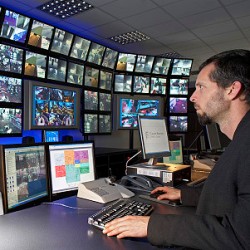Casino Security – A Peek behind the Curtains

Chances are that at some time you have watched a movie involving sophisticated criminals breaking into a high-security property and getting away with a king’s ransom. One such movie that springs to mind is the enormously successful Ocean’s Eleven franchise, in which George Clooney leads a team of burglars on a multi-million dollar casino heist, while making the robbery look like it’s actually doable. Nothing could be further from the truth, though, as you would expect from any buildings that may have more than $30 million inside it at any one time.
Over Before it Begun
In reality, casinos have incredibly comprehensive surveillance systems which run car plate recognition software, meaning that as soon as you arrive at the parking lot your vehicle will be picked up by the casino’s cameras. In other words, even before you’ve even parked your car, the casino’s security staff will have all the necessary information about you, including if you have any kind of criminal record.
You might think that fake plates would do the trick? Not really – if the system detects an inconsistencies or draws a blank, then the offender will be approached by security before you’ve even got past the casino lobby.
Facial Recognition
Any would-be miscreant who tries to be clever and arrives on foot has further bad news to contend with as every single camera in the casino is connected and wired to smart facial recognition software that cross-references a person’s face with the known database of criminals. Needless to say, if there is a facial match, then they will be marched straight out of the casino as the whole facial recognition system takes just 3 seconds to complete.
Floor Security
In addition to a casino floor that is being constantly monitored by surveillance cameras, the gambling venues also employ highly professional staff that are trained in a variety of techniques to help them spot any potential criminals. Their training includes attending courses at the Transportation Security Administration (TSA), which is the same organization which teaches airport security to identify potential terrorist suspects. Naturally, they are therefore adept at reading body language, spotting suspicious behavior, as well as any signs that a person may be concealing illegal items on their person, be they guns or devices which can be used for cheating. In fact, casino security staff will often approach any person that appears suspicious, or just doesn’t seem right.
AI Programs
Those people who attempt to get one over on the casino by using card counting techniques or even smuggling in advantage programs are also likely to face similar disappointment. These days, casinos utilize software such as TableEye21 which tracks a player’s performance at the blackjack tables, and if things do not correspond with expected predictions then that player could soon find themselves removed from the venue. As Prem Gurujan, the inventor of TableEye21, explains:
“You get a printout of the player’s skill level, how much you can expect to win from him and whether the dealer is making errors. Since the system tracks the player’s bets, the casino knows exactly how good a customer the player is.”
Only Way In via the Internet
In the past, hackers have enjoyed a measure of success, with one of the most high profile cases involving a team of students who in 2013 took the Crown Casino in Melbourne for $33 million. Basically what they did was pretty straightforward, as they hacked into the casinos’ surveillance system and obtained access to all the live footage.
The group subsequently teamed up with a high-roller who was present at the casino’s baccarat table, while the conspirators at home identified the cards that the croupier was dealing through the surveillance cameras. They then relayed the information to their wealthy accomplice, who managed to win $33 million in 8 quick hands of baccarat before the casino knew what was going on. After they did, it was too late and the casino is still trying to recover their losses.
So, while Ocean’s Eleven is widely exaggerated, there might be a way to succeed. Of course, there is a 99.9% possibility that you will get caught doing it.








